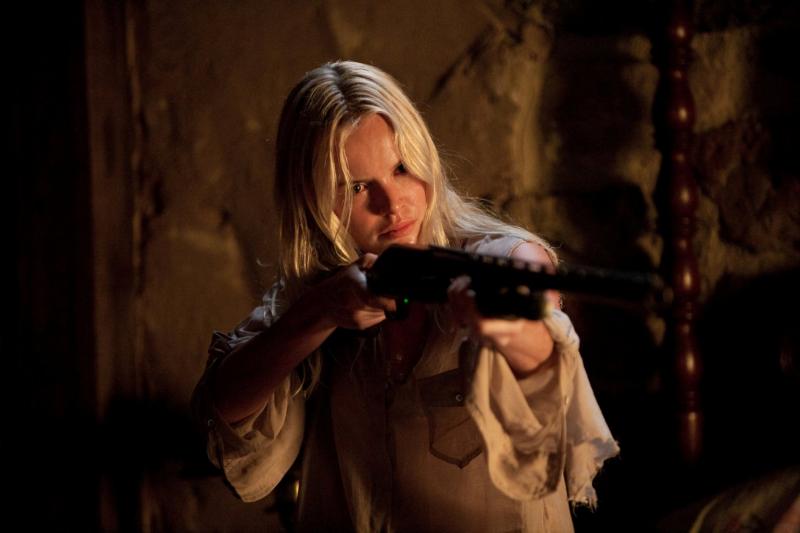Straw Dogs | reviews, news & interviews
Straw Dogs
Straw Dogs
Pale remake of Peckinpah's Seventies provocation

As this remake’s director Rod Lurie, a former film journalist, well knows, competing with Sam Peckinpah is a loser’s game. His films are no more replicable than a Fred Astaire musical, inseparable from their demonic creator.
I saw Straw Dogs in the Nineties when its long cinema ban finished, alongside its fellow scandals of the “Savage Seventies”, A Clockwork Orange and The Texas Chainsaw Massacre. The rape of Susan George’s character by her ex-boyfriend, which she plainly starts to enjoy until it becomes a gang-rape, cost its certificate. The notorious scene was defensible because the mingled sex and sexual violence, arousal curdling into almost unwatchable brutality, made me think and feel so much, letting loose strong sensations the mind struggled to control. Peckinpah’s misogyny was objectionable, but alive with its director’s (and George’s) visceral fearlessness.
Watch a clip from Peckinpah's 1971 Straw Dogs
No, Lurie doesn’t compete with that. Instead, every decision he makes domesticates Straw Dogs. Peckinpah, himself a stranger in a strange land, turned Cornishmen into Apache-style “savages”, with Hoffman a maddened lone cavalryman; alienation for British viewers, too, watching local character actors imitate inbred rednecks in the modern West Country. Lurie felt this flopped in the States because of its locale, so, says his producer, helpfully added a “familiar setting that was missing from the original”. Welcome then to Blackwater, Mississippi, and yet another tale of small-town Deep South intolerance, familiar from Deliverance to Footloose.

Such conflicts are normally resolved before anyone rapes the wife and hangs the cat, and Lurie is good in the long build-up before that happens. Fine acting helps. James Woods (above right) is a one-man wild card as the school team’s ex-coach, playing drunk with a shark-eyed stare, and reservoirs of violent feeling. Skarsgard’s rangy body and direct, almost goofy intelligence convince equally as an abandoned lover in Melancholia and an ageing jock rapist here. The Swedish actor’s version of quiet Southern civility is more intelligent and attractive than David, veiling effective menace. David’s attempts to integrate raise hackles: buying everyone a drink, he doesn’t stay for one himself. “Some people might call that rude,” muses Charlie as the bar-door swings.
When the rape comes, it feels like a film-studies replay of Peckinpah’s awful scene
Class lines are clearly and sympathetically drawn. “Plenty’s what the fuck I need,” mutters a builder when David’s wealth is discussed, in a town where the young black sheriff was in Iraq. Its people are better sketched than the original’s brutish yokels, till the rape scene requires them to be just that. Bosworth, raw-nerved and simply truthful, seems more angered by her effete husband than her violation. When that moment comes, Lurie shows her enjoying Charlie’s aggressive ravishing, as she earlier liked being bossed in bed by David, but it feels like a film-studies replay of Peckinpah’s awful scene, happily avoiding salaciousness, but too squeamishly flinching to affect you or her.
Though Lurie effectively critiques David, his film has its hero’s character. You could imagine David writing it, his buttoned-up Hollywood sensibility sanitising everything. It has the flatly golden look of every other recent Seventies horror remake: The Hills Have Eyes, The Texas Chainsaw Massacre, Halloween. Nothing lurks in these frames. Like their heroes, they’re sun-kissed, clean-limbed, innocent. The final confrontation may be meant as David’s private Stalingrad, strategising his survival instead of researching others’. It feels like a choreographed set piece from film-makers with no sense of ferocity. Forty years on, Peckinpah’s film still has a mongrel’s bite. This is a tame pet.
Watch the trailer to Straw Dogs
rating
Share this article
Add comment
The future of Arts Journalism
You can stop theartsdesk.com closing!
We urgently need financing to survive. Our fundraising drive has thus far raised £49,000 but we need to reach £100,000 or we will be forced to close. Please contribute here: https://gofund.me/c3f6033d
And if you can forward this information to anyone who might assist, we’d be grateful.

Subscribe to theartsdesk.com
Thank you for continuing to read our work on theartsdesk.com. For unlimited access to every article in its entirety, including our archive of more than 15,000 pieces, we're asking for £5 per month or £40 per year. We feel it's a very good deal, and hope you do too.
To take a subscription now simply click here.
And if you're looking for that extra gift for a friend or family member, why not treat them to a theartsdesk.com gift subscription?
more Film
 London Film Festival 2025 - a Korean masterclass in black comedy and a Camus classic effectively realised
New films from Park Chan-wook, Gianfranco Rosi, François Ozon, Ildikó Enyedi and more
London Film Festival 2025 - a Korean masterclass in black comedy and a Camus classic effectively realised
New films from Park Chan-wook, Gianfranco Rosi, François Ozon, Ildikó Enyedi and more
 After the Hunt review - muddled #MeToo provocation
Julia Roberts excels despite misfiring drama
After the Hunt review - muddled #MeToo provocation
Julia Roberts excels despite misfiring drama
 Ballad of a Small Player review - Colin Farrell's all in as a gambler down on his luck
Conclave director Edward Berger swaps the Vatican for Asia's sin city
Ballad of a Small Player review - Colin Farrell's all in as a gambler down on his luck
Conclave director Edward Berger swaps the Vatican for Asia's sin city
 London Film Festival 2025 - Bradley Cooper channels John Bishop, the Boss goes to Nebraska, and a French pandemic
... not to mention Kristen Stewart's directing debut and a punchy prison drama
London Film Festival 2025 - Bradley Cooper channels John Bishop, the Boss goes to Nebraska, and a French pandemic
... not to mention Kristen Stewart's directing debut and a punchy prison drama
 London Film Festival 2025 - from paranoia in Brazil and Iran, to light relief in New York and Tuscany
'Jay Kelly' disappoints, 'It Was Just an Accident' doesn't
London Film Festival 2025 - from paranoia in Brazil and Iran, to light relief in New York and Tuscany
'Jay Kelly' disappoints, 'It Was Just an Accident' doesn't
 Iron Ladies review - working-class heroines of the Miners' Strike
Documentary salutes the staunch women who fought Thatcher's pit closures
Iron Ladies review - working-class heroines of the Miners' Strike
Documentary salutes the staunch women who fought Thatcher's pit closures
 Blu-ray: The Man in the White Suit
Ealing Studios' prescient black comedy, as sharp as ever
Blu-ray: The Man in the White Suit
Ealing Studios' prescient black comedy, as sharp as ever
 The Woman in Cabin 10 review - Scandi noir meets Agatha Christie on a superyacht
Reason goes overboard on a seagoing mystery thriller
The Woman in Cabin 10 review - Scandi noir meets Agatha Christie on a superyacht
Reason goes overboard on a seagoing mystery thriller
 London Film Festival 2025 - crime, punishment, pop stars and shrinks
Daniel Craig investigates, Jodie Foster speaks French and Colin Farrell has a gambling habit
London Film Festival 2025 - crime, punishment, pop stars and shrinks
Daniel Craig investigates, Jodie Foster speaks French and Colin Farrell has a gambling habit
 I Swear review - taking stock of Tourette's
A sharp and moving tale of cuss-words and tics
I Swear review - taking stock of Tourette's
A sharp and moving tale of cuss-words and tics
 A House of Dynamite review - the final countdown
Kathryn Bigelow's cautionary tale sets the nuclear clock ticking again
A House of Dynamite review - the final countdown
Kathryn Bigelow's cautionary tale sets the nuclear clock ticking again

Comments
I'm not a fan of remakes,